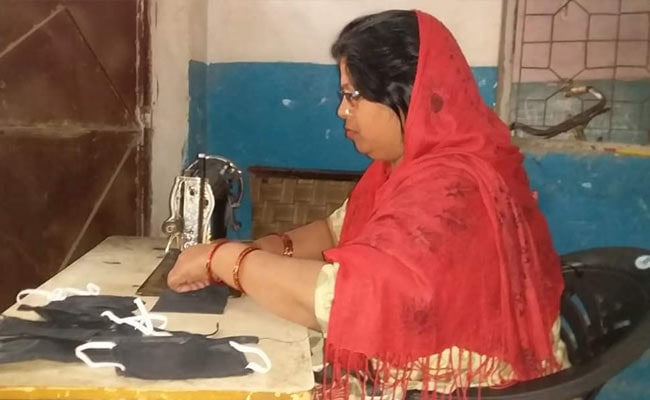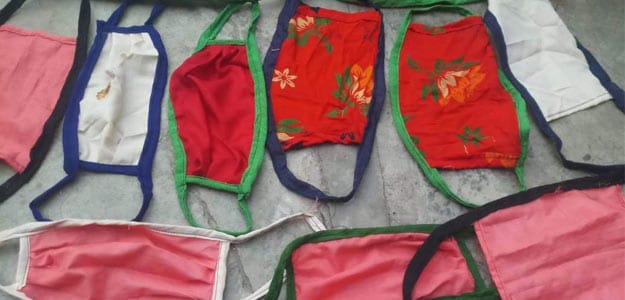- Home/
- Containing Coronavirus: Chintan, Delhi Based NGO Upcycles Old Clothes Into Masks, Distributes It Among Waste Pickers
Containing Coronavirus: Chintan, Delhi Based NGO Upcycles Old Clothes Into Masks, Distributes It Among Waste Pickers

As the fight against the novel coronavirus (COVID-19) deepens, the opinion is shifting in favour of wearing masks all the time. According to the recent government guidelines, individuals not suffering from any medical conditions or having breathing difficulty may use the handmade reusable face cover, particularly when they step out of their house. The Office of the Principal Scientific Advisor to the government of India has even issued a step by step do it yourself (DIY) guide on homemade face masks and their usage. But even before the government decided that everyone should wear masks, Chintan, a non-governmental organisation (NGO) working for the environment, started stitching and distributing masks among waste pickers. The initiative has been undertaken to contain the spread of the disease and the outbreak from entering stage three – community transmission - when a patient not exposed to any infected person or one who has not travelled to any of the affected countries tests positive.
As part of the initiative, Chintan has trained 70 senior trainees (teachers) working in the organisations's informal learning centres to upcycle old clothes into face masks. Talking to NDTV about the idea behind the initiative and how it is being implemented, Chitra Mukherjee, Head of Advocacy and Policy at Chintan said,
We run informal learning centres for children of waste pickers. There we have senior trainees who educate them before they are enrolled in municipal schools for formal training. Now when the centers are closed because of the lockdown and we need masks, our trainees have taken it upon themselves to upcycle old clothes into face masks for waste pickers. We trained our senior trainees working in different communities to make masks in the safety of their own homes and distribute it among waste pickers and their families. These masks are not only for the parents of our students but for the entire waste pickers' community.
Also Read: A Delhi Based NGO Undertakes Awareness, Sanitisation And Thermal Screening To Help Fight Coronavirus
A team of 70 senior trainees makes close to 350 masks, daily. As of now, the team has created 4,680 pieces of masks of which 3,560 have already been distributed in different areas including Vivekananda Camp, Takiya Kale Kha, Sihani, Dallupura, Bhalswa, JJ Bhopura.
Further elaborating on the idea behind stitching masks at home and distributing it among waste pickers for free, Ms Mukherjee said,
In poor communities like those waste pickers live in, it is difficult for them to procure masks and yet they need it the most. They live in cramped social spaces and social distancing is a luxury there. Also, it's difficult for waste pickers' community to buy a mask and keep changing it every three to four hours because of the two reasons - unavailability of masks and lack of affordability.
Also Read: These Hunger Heroes Are Feeding The Poor And Hungry In Delhi Amid The COVID-19 Lockdown

Old cotton clothes upcycled into face masks to protect waste pickers' community from the novel coronavirus
Though the masks are fashioned out of old clothes, the team ensures hygiene and follow all the precautionary measures. Explaining the making of face masks, Anita Sihani, a senior trainee said,
Since we all are in isolation, we are using the material available with us at home. For instance, we take old cotton bedsheets to make masks. Before using the cloth, we wash it thoroughly and while making masks, we ensure hand hygiene. As far as the technique is concerned, we have seen the face masks available in the market and we are replicating the same design.
The whole point of wearing a mask while stepping out of the house nullifies if it's not worn and used properly. Keeping this in mind, while distributing the masks, the Chintan team ensures everyone knows how to use a mask.
We repeatedly tell them to wash and change the mask every three to four hours, said Ms Mukherjee.
Even before the lockdown began and the team decided to make masks, Chintan was creating awareness among waste pickers through children coming to its informal centers. In early March, senior trainees had started training children; they would teach the right way of washing hands, coughing etiquette – coughing into the crook of the elbow and other preventive measures and ask the children to pass on the message in their respective communities. Following this, some people even started using a handkerchief as a face cover.
After seeing the hard work of you all, we have also been optimistic. We will be careful and not afraid, said 30-year-old Islamuddin, from Takiya Kale Kha.
also read
Despite Nationwide Lockdown, People Employed In Health And Financial Sector Continue To Provide Services
Written by Ambika Singh KahmaHow Police Officers Are Battling The Crisis Of Coronavirus And Going Beyond The Call Of Duty
Written by Ambika Singh Kahma28-Year-Old From UP Donates Disability Pension Money To COVID-19 Fund, Urges Others To Help The Cause
PTI
Telethon Highlights
MoreQuick Links
More- NDTV News Desk | Thursday April 02, 2020
Prime Minister Narendra Modi today announced a total lockdown in India from midnight for 21 days to fight the spread of coronavirus.
- NDTV News Desk | Friday April 03, 2020
India must also straight away allow internationally-recognized testing kits to be used here - these are already in use in the USA and Europe (do not delay by waiting for Indian clearance).
- Written by Garima Arora | Sunday April 12, 2020
Coronavirus outbreak: Take necessary precautions. Practise personal hygiene and social isolation. Utilise this time to do all the things you never found the time to do earlier. Here are some more tips to maintain your mental health by Psychiatrist Dr Sanjay Chugh
- NDTV News Desk | Thursday April 02, 2020
Hopefully, you are following social distancing and not mingling, especially with large groups or in crowded places. Can wearing a mask help? Here's what doctors say:
- NDTV News Desk | Thursday April 02, 2020
People across the world are worried about the rising cases of COVID-19, a highly contagious disease caused by the Novel Coronavirus that was first detected in China's Wuhan in December last year. What should you do if you're feeling any little ill, flu-ish and you are worried that you have symptoms of coronavirus?
- Edited by Deepshikha Ghosh | Thursday April 02, 2020
Coronavirus India: Airlines have been asked to ensure distance at check-in counters and enough space as passengers wait for their flights








